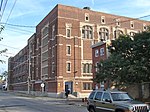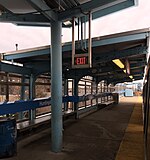Beatty's Mills Factory Building
Industrial buildings and structures on the National Register of Historic Places in PhiladelphiaIndustrial buildings completed in 1886Italianate architecture in PennsylvaniaKensington, PhiladelphiaTextile mills in the United States

Beatty's Mills Factory Building, also known as Powell Mills, is a historic textile mill in the Kensington neighborhood of Philadelphia, Pennsylvania. It was built in 1886, and is a five-story, red brick building in the Italianate style. It was part of a complex of five buildings and is the only remaining structure. It is attached to a two-story school building built in 2002. The building housed textile-related manufacturing operations until 2000. It houses the Coral Street Arts House.It was added to the National Register of Historic Places in 2004.
Excerpt from the Wikipedia article Beatty's Mills Factory Building (License: CC BY-SA 3.0, Authors, Images).Beatty's Mills Factory Building
East Hagert Street, Philadelphia
Geographical coordinates (GPS) Address Nearby Places Show on map
Geographical coordinates (GPS)
| Latitude | Longitude |
|---|---|
| N 39.984444444444 ° | E -75.128611111111 ° |
Address
East Hagert Street
East Hagert Street
19125 Philadelphia
Pennsylvania, United States
Open on Google Maps





